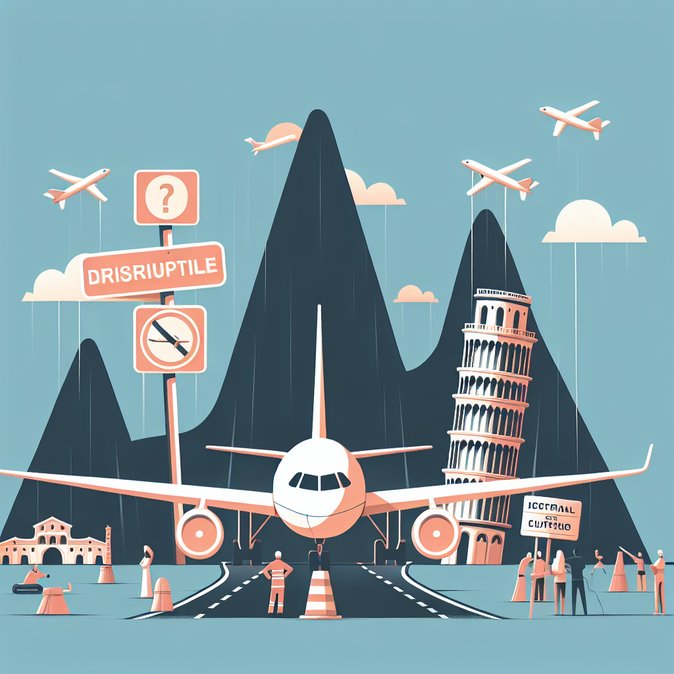
French corporate mobility managers woke up on Wednesday, 29 October 2025, to the unwelcome news of a coordinated wave of industrial action at four key Italian airports—Milan Linate, Milan Malpensa, Pisa and Florence—that is expected to reverberate across European flight schedules. Ground-handling staff at the affected hubs have filed 24-hour walk-outs, while separate four-hour stoppages by Vueling cabin crew (13:00-17:00) and Air France/KLM ground personnel (12:00-16:00) threaten to compound the chaos.
Although air-traffic controllers are not formally taking part, the knock-on effects of crew and ramp shortages are likely to trigger delays and cancellations well beyond Italy’s borders. Air France has already warned Paris-based corporate accounts to anticipate last-minute schedule changes on the crucial Milan–Paris Charles-de-Gaulle and Florence–Paris Orly shuttles. Multinational firms relying on day trips between French headquarters and Italian manufacturing sites have advised staff to postpone non-essential travel or book rail alternatives via Turin and Ventimiglia.
Under Italian law, so-called “protected” time-windows guarantee a skeleton service for medical, connecting-flight and unaccompanied-minor passengers, but business travellers should brace for long queues at check-in, baggage drops and security. Airlines are exercising EU261 re-routing obligations, yet availability is already tight because the strikes overlap with the autumn half-term peak. Travel-management companies (TMCs) are recommending that employees build in 24-hour buffers for meetings scheduled in Milan’s Rho-Pero exhibition district or Florence’s Pitti Uomo trade fair.
For French employers, the dispute is a reminder of the vulnerability of intra-EU mobility to local labour unrest. The strikes come only weeks before the EU’s new Entry/Exit System (EES) goes live, raising concerns that any additional processing times at border controls—especially for non-EU nationals flying on French-issued Schengen visas—could tip congested airports into further disarray.
In practical terms, mobility teams should: (1) advise travellers to check flight status every few hours; (2) collect boarding-pass scans and delay notices for potential EU261 claims; (3) ensure that critical staff carry fully flexible rail or rental-car bookings; and (4) brief HR on the possibility of overnight stays and associated per-diem costs.
Although air-traffic controllers are not formally taking part, the knock-on effects of crew and ramp shortages are likely to trigger delays and cancellations well beyond Italy’s borders. Air France has already warned Paris-based corporate accounts to anticipate last-minute schedule changes on the crucial Milan–Paris Charles-de-Gaulle and Florence–Paris Orly shuttles. Multinational firms relying on day trips between French headquarters and Italian manufacturing sites have advised staff to postpone non-essential travel or book rail alternatives via Turin and Ventimiglia.
Under Italian law, so-called “protected” time-windows guarantee a skeleton service for medical, connecting-flight and unaccompanied-minor passengers, but business travellers should brace for long queues at check-in, baggage drops and security. Airlines are exercising EU261 re-routing obligations, yet availability is already tight because the strikes overlap with the autumn half-term peak. Travel-management companies (TMCs) are recommending that employees build in 24-hour buffers for meetings scheduled in Milan’s Rho-Pero exhibition district or Florence’s Pitti Uomo trade fair.
For French employers, the dispute is a reminder of the vulnerability of intra-EU mobility to local labour unrest. The strikes come only weeks before the EU’s new Entry/Exit System (EES) goes live, raising concerns that any additional processing times at border controls—especially for non-EU nationals flying on French-issued Schengen visas—could tip congested airports into further disarray.
In practical terms, mobility teams should: (1) advise travellers to check flight status every few hours; (2) collect boarding-pass scans and delay notices for potential EU261 claims; (3) ensure that critical staff carry fully flexible rail or rental-car bookings; and (4) brief HR on the possibility of overnight stays and associated per-diem costs.








